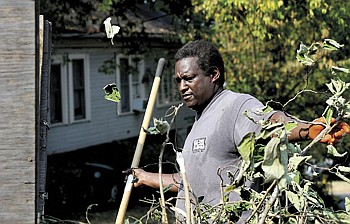When he was laid off in early 2009, James Matthews was one month away from logging 20 years with his employer, Chattanooga General Services.
The 48-year-old Chattanoogan not only lost his job in warehouse and transportation services, he also lost his health insurance.
Matthews has been looking for work for 18 months, and his extended health benefits through COBRA ran out last year.
On a recent morning at the Tennessee Career Center in the Eastgate Town Center, Matthews said he's heard his former employer is hiring again but only part time and without health benefits.
"It's frustrating sometimes," he said in the waiting room full of Chattanoogans also in search of work. "You're hopeful that the markets change."
As millions of Americans have lost jobs and employer-sponsored health insurance in the economic downturn, the number of uninsured continues to grow.
In 2009, the number of Americans without health insurance passed 50 million for the first time, according to U.S. Census Bureau data released this month.
From 2008 to 2009, the proportion of uninsured Americans grew from 15.4 percent to 16.7 percent, or 50.7 million people, data showed. The increase was largely because of the loss of employer-sponsored health care insurance, the bureau reported.
The percentage of Americans covered by employer-based health insurance - 55.8 percent - is the lowest since 1987, the first year that comparable data were collected, according to the Census Bureau.
Between 2007 and 2009, Tennessee's uninsured rate averaged 14.9 percent. Georgia's rate was 18.6 percent, significantly higher than the national rate.
The data also show Georgia with an 18.4 percent poverty rate, fifth-worst in the nation, and Tennessee with a 16.5 percent rate. The national average is 14.3 percent, the highest since 1994.
According to the Census Bureau, 43.6 million Americans are living in poverty.
LOCAL RESOURCES* Project Access, 826-0269 (Hamilton County residents)* Volunteers in Medicine, 855-8220 (Hamilton County residents)* Southside Community Health Center, 778-2700, or Dodson Avenue Community Health Center, 778-2800* Dr. William Roy Mercy Dental Clinic, 1800 Roanoke Ave. Call coordinator Allison Taylor at 698-3178, ext. 106* Local public health department's Family Health Adult Clinic, 209-8050* Primary Health Care Center, with clinics in Rossville and Trenton, Ga., 706-657-7575
Locally, many uninsured are actually working multiple part-time jobs that don't offer health benefits, said Rae Bond, executive director of Project Access. The program treats Hamilton County residents who earn up to 150 percent of the federal poverty level and can't get health insurance.
"We're seeing people come to Project Access who have lost their jobs or who have never been able to afford insurance," Bond said. "We're having to triage and try to be sure to direct the most-urgent care to the most-urgent patients first."
So far this year, Project Access has screened 1,910 people requesting help, 200 more than in all of 2008, Bond said.
Skipping care
Local health professionals worry that people without insurance will skip preventive care.
"That's been a problem for us ever since the recession started," said Diana Allen, CEO of Primary Health Care Center. "We're seeing folks who have not seen a doctor or dentist in a long, long time."
Primary Health Care Center is a nonprofit that runs federally qualified community health centers in Rossville and Trenton, Ga.
Skipping primary care and dental check-ups worries Sharon DeBard, a Chattanooga resident and former corrections officer who is out of work and uninsured. She grimaces when she mentions toothaches that have gone untreated.
"When I had health insurance, I could go to the dentist, go to the OB-GYN," she said. "Now I feel like I'm kind of behind because I'm letting things go. Without any insurance, it's like, 'What do you do?'"
Low-income people who are uninsured or underinsured can get care at federally supported health clinics such as the Southside and Dodson Avenue Community Health Centers. Dodson also provides dental services, as does the Dr. William Roy Mercy Dental Clinic in East Chattanooga.
The dental clinic, which mostly does pain management and tooth extractions, has seen volume rise from 300 patients per month to more than 400 starting in 2009, said coordinator Allison Taylor. Often, the patients work part time and don't have benefits, and lately many have been laid off and lost their insurance, she said.
Many are in severe pain, she said.
"Everybody that walks in the door is not poverty-stricken. They're just in a bad situation at that point in time," she said. "People drive up in these nice cars and say, 'Hey, we just don't have insurance. I just cannot afford $200 to $300 when I walk in the door'" at a dentist's office.
Even for those do have insurance, high-deductible plans that require big out-of-pocket payments can put some services out of reach, Bond said.
Under federal health reforms taking effect in 2014, people must buy insurance or face penalties. Millions are expected to be added to state Medicaid programs.
But even with reform, about 20 million people nationwide likely still will be uninsured, according to estimates from the Congressional Budget Office.
